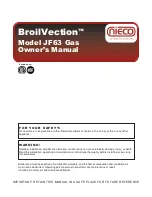
E
GB
I
LINDA
64
-19-
SVUOTAMENTO DELL'IMPIAN-
TO DI RISCALDAMENTO
Lo svuotamento dell'impianto di riscaldamento
deve essere eseguito nel seguente modo:
- spegnere la caldaia;
- ruotare il rubinetto di scarico dell'impianto rac-
cogliendo in un contenitore l'acqua che
fuoriesce.
- svuotare dai punti più bassi dell'impianto (dove
previsti). Se si prevede di tenere l'impianto fer-
mo, nelle zone in cui la temperatura ambiente
può scendere nel periodo invernale al di sotto
di 0°C, si consiglia di aggiungere liquido anti-
gelo a base di glicoli etilenici all'acqua dell'im-
pianto di riscaldamento in alternativa a ripetuti
svuotamenti.
SVUOTAMENTO DELL'IM-
PIANTO SANITARIO
Ogni qualvolta esista pericolo di gelo, deve es-
sere svuotato l'impianto sanitario nel seguente
modo:
- chiudere il rubinetto generale della rete idrica;
- aprire tutti i rubinetti dell'acqua calda e fredda;
- svuotare dai punti più bassi (dove previsti).
SMONTAGGIO DEL MANTELLO
Per poter eseguire le operazioni in seguito de-
scritte, è necessario smontare il "mantello" della
caldaia operando nel seguente modo:
- Svitare le quattro viti poste nella parte inferio-
re e le quattro nella superiore della caldaia;
- Estrarre il"mantello" della caldaia sfilandolo
dalla parte frontale.
EPTYING THE HEATING
SYSTEM
The heating system must be emptied as follows:
- Turn off the boiler;
- Open the drain valve for the system and place
a container below to catch the water that comes
out;
- Empty the system at the lowest points (where
present). If you plan on not using the heating
system for an extended period of time, it is
recommended that you add antifreeze with an
ethylene glycol base to the water in the heating
lines and radiators if the ambient temperature
drops below 0°C during the winter. This makes
draining the entire system unnecessary.
DRAINING THE DOMESTIC
HOT WATER SYSTEM
Whenever there is the danger of the temperatu-
re dropping below the freezing point, the
domestic hot water system must be drained as
follows:
- Turn off the general water valve for the
household plumbing system;
- Turn on all the hot and hold water faucets;
- Empy the remaining water from the lowest
points in the system (where present).
REMOVING THE OUTER SHELL
In order to perform the procedures described
below, the outer shell of the boiler must be
removed as follows:
- Remove the four screws located on the bottom
part of the boiler, as well as the four screws at
the top;
- Remove the outer shell of boiler by sliding it
out from the front.
VACIADO DE LA INSTALACION
DE CALEFACCION
El vaciado de la instalación de calefacción
debe de ser ejecutado en el siguiente modo:
- Apagar la caldera;
- Girar el válvula de desagüe de la instalación
recolectando en un contenedor el agua que se
derrame.
- Favorecer el vaciado utilizando lo puntos
inferiores de la instalación (si los posee). Si se
prevee de tener la instalación inactiva, en zonas
en las que la temperatura ambiente puede
descender durante el invierno por debajo del
0°C, se recomienda de añadir líquido
anticongelante a base de etilenglicol al agua
de la instalación de calefacción en alternativa
a repetidas operaciones de vaciado.
VACIADO DE LA INSTALACION
PARTE USO HIGIENE
Cada vez que exista el peligro de heladas, debe de ser
vaciada la instalación uso higiene de la siguiente manera:
- Cerrar la válvula general de la red hidráulica;
- Abrir todas las llaves del agua fría y caliente;
- Favorecer el vaciado utilizando lo puntos
inferiores de la instalación (si los posee).
DESMONTAJE DE LA CAPA
Para poder ejecutar las operaciones descritas a
continuación es necesario desmontar la capa de
la caldera actuando en el siguiente modo:
- Desatornillar los cuatro tornillos colocados en
la parte inferior y los cuatro de la parte superior
de la caldera;
- Quitar la "cubierta" de la caldera, extrayéndola
de la parte frontal
Содержание LINDA 23 CA CPA
Страница 26: ...E GB I LINDA 64 26 ANNOTAZIONI NOTAS ANNOTATIONS...
Страница 27: ...E GB I LINDA 64 27...










































